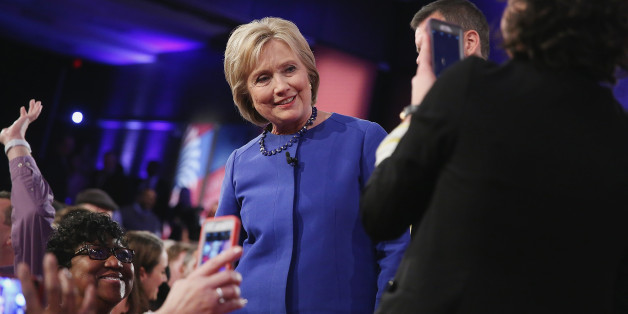
Hillary Clinton made a 180-degree turn in the focus of her message between New Hampshire and Nevada. She switched from "I" to "we." In New Hampshire it was all about her, "a progressive who likes to get things done." In Nevada it was about "each of us working together."
There's been an ocean of punditry about how Clinton needed a better message. In the 10 days between her New Hampshire concession and her Nevada victory speech, she found one. In doing so, she moved closer to Bernie Sanders in her appeal but still kept her distance from Sanders's call for a populist movement.
In New Hampshire, Clinton used "I" almost twice as often as she used "we" or "we're" in her concession speech. Sanders, by contrast, used "we" or "we're" more than twice as much as he used "I" when he gave his New Hampshire victory speech. Clinton's use of "I" was not just because it was a concession speech, where she was taking responsibility for losing. Her standard stump speech was about her qualifications to get things done.
But in her Nevada victory speech, Clinton used "we" three and half times as often as "I." That switch entirely changed the emotional content of her address, from exclusive to inclusive. It is also a powerful indicator that, in an environment where people are deeply suspicious of politicians in general and Clinton in particular, she is shifting the story of her campaign away from her resume and focusing on how she will bring all Americans into the political process.
Clinton should have been prepared for this. After all, in 2008 she was beaten by "Yes We Can." But her campaign signs this year still keep the spotlight on her, with the message "Fighting for Us," not that we're all in the fight together. Sanders's slogan, by contrast, is a "A Future to Believe In." The consistent message is that his campaign is not about himself as a candidate; it is about a historic movement that he's not so much leading as unleashing.
Here's how Sanders described that view in the televised town hall held before the New Hampshire primary:
Change, in my view, and what history tells us, has always come from the bottom on up. That's what the Civil Rights movement was about. That's what the women's movement was about. That's what the gay movement was about. That's what the environmental movement is about. ... Those are the kinds of movements that we need, and that's how we will bring about real change in this country.
When Clinton spoke after her loss in New Hampshire, she told a very different story of why people should vote for her:
What is the best way to change people's lives so we can all grow together? Who is the best change-maker? Here's what I promise. Here's what I promise: I will work harder than anyone to actually make the changes that make your lives better.
But somewhere on the road from Concord to Las Vegas, Clinton did an about face, declaring in Nevada, "This is your campaign, and it is a campaign to break down every barrier that holds you back."
In their televised debate before the Nevada primary, Sanders emphasized in his concluding statement that no president can deliver on his own, which is very different from Clinton's focus on being someone who can "get things done." But by election night in Nevada, Clinton was sounding more like her challenger: "Now, no one can get this done alone, not even the President of the United States. It's got to be the mission of our entire nation. I have never believed in dividing America between us and them. We are all in this together, we all have to do our part."
Still, Clinton's version of collective action remains distinct from Sanders, as she turns away from his constant contrast with the 1 percent. Look again at the statement above, where Clinton makes a point of not "dividing America between us and them." Compare that to the Sanders campaign ad called "Together," which ends with the senator declaring, "When we stand together and demand that this country work for all of us, not just the few, we will transform America."
Clinton is willing to borrow Sanders's populism but not keep it for long, as in this section of her Nevada speech:
So, let me say this to the men and women who run our countries corporations. If you cheat your employees, exploit consumers, pollute our environment, or rip-off taxpayers, we're going to hold you accountable.
But, if you do the right things, if you invest in your workers, contribute to your communities, help build a better America, we're going to stand with you. We're going to go into the future together. We need more jobs. We need more opportunity.
Clinton's embrace of "we're all in this together" -- one of her husband's famous memes -- stops well short of the populist story behind the Sanders campaign. It enables her to move from focusing on herself to her vision for the country and her sympathy with people. It's the message she needed to find.
But it's still not a message that will build a movement for the kind of political change that will be needed to actually win even the more modest policy changes she supports in the face of Republican intransigence. Doing that will take the kind of historic movement Sanders is calling for, and such a movement needs more than appeals to togetherness -- it needs the power of anger at the status quo and hope for big changes that will transform people's lives. Without that movement, a President Clinton will likely to be on her own, finding it very hard to be that progressive who can get things done.


